With the Poshan Abhiyaan scheme gathering pace, Unicef is focusing on working with the Indian government and states to ensure that the message of nutrition reaches every mother, every child, every family, and that people are not eating just to get a full stomach, but also ensuring the food is nutritious, says Arjan de Wagt, Chief of Nutrition, Unicef India.
With its network of 13 offices and fanning across 16 states, Unicef India is focusing on supporting the government’s Nutrition Mission in a big way through programmes to increase awareness and understanding of good nutrition, de Wagt told Outlook.
Describing the Poshan Abhiyaan mission as “unique”, de Wagt said, “I really hope that this is a moment of change. And there is so much to be done when it comes to nutrition. We know what the problem is in India. We know what can be done. India can do it, and how are we going to work together to ensure that these high nutrition interventions are reaching the people on the ground.”
He said that Unicef is working with the government to promote the Jan Andolan, or mass movement, on Poshan Abhiyaan to tackle the malaise of malnutrition, with India being home to a third of the world’s malnourished children.
“Government has launched a Jan Andolan, and how can we promote it. I would call nutrition literacy all about good nutrition, about good diet. We recognize that the government is doing big tasks; they have the ASHA workers, Anganwadi workers, the health workers – all getting engaged from the government side. But it is not enough..”
“Changing behavior and understanding of nutrition is such a big thing. There are so many aspects involved, of young children, older children, girls, adolescent girls, about anaemia, nutrition in pregnancy -- so we need many more to come on board. The government cannot do it alone,” said de Wagt.
Talking about the ills of malnutrition, de Wagt said that half of children are too slim or too short, which means that their immune system is not as strong, and also their cognitive development is low. “Because they need the nutrients to develop. The government has programmes like Poshan Abhiyaan, but at the end of the day the government is not responsible for feeding the children; it is the parents, the communities, that are responsible for feeding the children.”
Explaining how Unicef contributes, he said that at the state level the UN body provides technical support to government to promote breast feeding, and improve feeding practices, including complementary feeding of children from 6 months to 2 years of age.
“We also have a programme to advocate for, and provide technical support to government. How do you identify malnourished children, and how do you treat them? Because no malnourished child has to die -- if you can find them in time you can do something with them.”
Unicef is also part of the Union Health and Family Welfare Ministry’s programme of “Anaemia-mukt Bharat” or anaemia-free India. “Unicef provides support by designing the programme, support with the technical guidelines, and helping develop the educational tools, the posters, the radio materials.”
Unicef is also doing monitoring of the anaemia-free programme and gets reports and data on quarterly basis on the number of schools, or health facilities, and districts that do not get iron folic tablets, and also on the coverage of the programme. Unicef provides feedback to the district collectors – on how well the district is faring.
“So, in various aspects we provide support to the government. Unicef is more into providing technical support and guidance to the government at the national and state level,” he said.
On the national nutrition mission, he said “Poshan Abhiyaan is unique. I’ve been told by people working in this field in India for 40 years that they have never seen anything like this.”
“We are trying to work together to ensure that these high nutrition interventions are reaching every mother, every child, every family. And how are we going to ensure that nutritional literacy is there in every family in India. That they are not just eating to get a full stomach, but they are going to eat because they know nutrition is important,” de Wagt said.
Elaborating on the move to rope in the private sector, he said the new initiative called IMPAct4Nutrition is a platform for the private sector to actively engage and build a social movement with their employees, customers and employees’ families who form a part of their business ecosystem to take forward the Poshan Abhiyaan.
“This is an effort to mobilise the private sector to get involved. Outlook media is a very good example to educate people about the importance of nutrition. We hope that there are many other companies, not just from the media sector, that will start educating their employees.
“Imagine if all companies in India start teaching their staff, and family of their staff about the importance of hand washing, about good health behavior, about good diets and good nutrition – we could reach hundred millions of people -- just like that. And that is in-house,” he said.
IMPAct4Nutrtion, an initiative convened by UNICEF, Tata Trusts, Sight and Life, CSRBOX, CII, WeCan and NASSCOM Foundation was launched in New Delhi on March 13.
Poshan Abhiyaan has fixed goals to reduce low birth weight, stunting and undernutrition (the prevalence of underweight) in children (up to six years of age) by 6% in three years, at the rate of 2% a year; and anaemia among children, adolescent girls and women (up to 49 years of age) by 9%, at the rate of 3% a year.
To tackle malnutrition, the scheme focuses on the first 1,000 days of a child, which includes nine months of pregnancy, six months of exclusive breastfeeding and then the period from six months to two years.


























